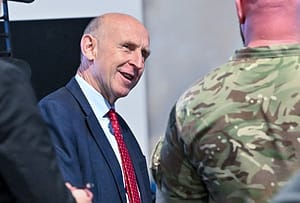This should have been a scandalous story of gossip.
God knows how I thought I could out-manoeuvre a former secretary of state for defence. Someone who helped bring the Bosnian war to an end, who flexed his stratagems in the cabinets of both John Major and Margaret Thatcher, who served as a cabinet minister, all in all, for some 18 years. Someone whose entire career has been dependent on the ability to rhetorically joust with the greatest minds the world has to offer, to linguistically defeat legions of other well-armoured politicians, to colloquially fence with arms traders, military generals and violent extremists.
And, um, me.
Yes, though I may be your humble editor here at LondonlovesBusiness.com, and though a few years of journalistic experience have given me at least, I would hope, some small semblances of verbal dexterity, it turns out I am no match whatsoever for Sir Malcolm Rifkind.
I went to meet him a few weeks back after we published our discovery that he is the highest-earning London MP. Sir Malcolm, at time of publishing, had earned £240,000 in the nine months since the start of the year, on top of his MP’s salary of £65,738.
I duly engaged in the correspondence tete-a-tete that such a situation demands. A little tongue-in-cheek charm, a streak of unadulterated one-up-man-ship…
Dear reader, I yearn to be able to recount a career-embellishing tale of journalistic prowess, in which I reveal the former defence secretary as a money-grabbing scoundrel with conflicts of interest sprouting out of every Portcullis House desk drawer.
But, rather unfortunately for the Scandalous Headline Potential of this article, Mr Rifkind charmed me into the much more boring state of actually rather liking him. Tedium, I know. I hereby relinquish any façade I formerly maintained of being able to handle expert politicians in an interview situation.
Mr Cameron, if you’re reading this, don’t even bother to invite me for an editorial lunch next week. Save me the embarrassment and foray into Pret A Manger alone. I implore you.
So, with a heavy head, I must now tell the infinitely more mundane story of a (very unexcitingly) pleasant and informative meeting with – oh forgive me – a very nice Sir Malcolm Rifkind.
Step 1: Stealthily prepare your battle strategy
So, at the end of September, we published the article on Sir Malcolm being the highest-earning London MP. We had been talking to Sir Malcolm’s press team throughout the process of writing and researching the article, but sadly not to the man himself, as he was overseas.
After publish date, a few quiet days ensued. Then I received that adrenaline-injecting manna of the editorial day-to-day: a personal email from a high-profile politician who is pissed off with your story. Hurrah!
I duly engaged in the correspondence tete-a-tete that such a situation demands. A little tongue-in-cheek charm, a streak of unadulterated one-up-man-ship, a defiant defence of my journalist, a smattering of wholeheartedly disrespectful condescension. (These are some of the greatest joys of being editor, in case you hadn’t yet guessed.)
Eventually, on rather prickly-yet-polite terms, we agreed to meet face to face.
Having been rather pooh-poohed throughout aforementioned email interchange, I arrived at Sir Malcolm’s Portcullis House office stocked with an armoury of witty ripostes, should he regurgitate any of the arguments he had made to me, rather sniffily, over email.
Step 2: Masterfully charm the editorial savviness out of your opponent entirely
Instead – tragic day – Sir Malcolm welcomed me with a beaming smile, a stream of warm words welcoming me to the building, a lovely little outline of the history of the Houses of Parliament. All topped off with a gentlemanly offer to take my coat, and oh won’t you take a seat.
Bummer. I didn’t stand a chance.
Step 3: Be very lucid and in all respects a political mastermind
Sir Malcolm proceeded to provide me with an altogether convincing explanation of why it is actually fine that he earned £240,000 on top of his MP salary.
Long story short, he’s a grafter. “If you’ve been a cabinet minister or a minister at a lower level, and either for that reason or because of your temperament, you’re used to working very hard – long hours most days of the week – then being a backbencher is not very demanding in terms of pressure, or in terms of time.” Right. Well, I suppose being MP for Kensington probably isn’t quite as demanding as being foreign secretary, or secretary of state for defence, or transport secretary, all of which Rifkind has been.
“You put in as much as you need to, to do the [MP for Kensington] job properly. You don’t need to go looking for work in your constituency. You’re there to deal with your constituents’ problems, but also to be a voice for them in the Houses of Parliament. That can be done in my judgement (and each person’s view is different) in not very much time, compared to the pressures I was under when I worked as a minister or in other roles.” Right. Well, that does make sense. And in that case, he probably does have a bit of spare time to earn some extra cash elsewhere.
But isn’t there something that feels a bit wrong about MPs making heaps of extra pocket money on the side? “The media inference is always that there is slightly something, erm, improper about it,” Rikfind says. Yet he believes “it’s in the public interest that members of parliament should have broader interests,” and that they should dip their toes in different sectors accordingly, whether or not that is concurrent with serving as an MP, and whether or not that is for financial gain. He adds: “It’s interesting that when the public have been asked these questions in surveys and so forth, overwhelmingly they’ve said that they prefer members of parliament to be in touch, and not just in Westminster’s ivory tower, being pure politicians and nothing else.”
Rifkind also points out that being an MP is a peculiar career as it does not financially reward progression, seniority or experience. “In any other walk of life you begin at a junior level, and as you progress, your responsibilities increase, and your salary increases with it. And by the time you’re in your 40s or 50s, your salary is very much higher than when you were in your 30s, if your talent is justified.
“In politics, that [salary increase] can only happen if you’re lucky enough to become a cabinet minister.” He adds that: “Nobody goes into parliament to become rich.”
This is in part why, he says, he feels wholly justified in earning a considerable amount on the side of his MP salary of £65,738. “The [MP] salary is a lot more than the national average, and therefore to a person on £30,000 or £35,000 sounds a reasonable salary. But as you rightly say” – I had just rightly said this – “it is very much less than a professional businessperson would expect these days.”
“Suddenly two thirds of your income disappears. Can you live with that uncertainty?”
Rifkind thinks the Houses of Parliament should represent a wide breadth of professions and backgrounds: teachers next to bankers, doctors side by side with accountants. “But unless Members of Parliament can have other sources of income as well as other sources of interest and activity then, increasingly, potential high earners won’t touch the Houses of Parliament with a bargepole. We’re not just talking about City whizzkids, but professional people – senior doctors, senior industrialists, or senior journalists.”
He believes the way to continue to attract those who could be paid considerably more elsewhere is
to allow them to do paid private sector work on the side, provided: they register in the members interest “not just what you do but how much you get paid for it”; “as long as your constituents are happy to re-elect you; proper democratic accountability is maintained; and you get that breadth of experience.
“Then for those who wish to have a slighter better standard of living and who can combine their other responsibilities with their parliamentary responsibilities, that [i.e. permitting them to do paid private sector work on the side] is the way you meet the requirement.”
Rifkind also, with yet more blasted reasonableness and confoundedly acceptable logic, explains that side earnings permit politicians financial security in a relatively unpredictable profession. Parliament, he says, is “snakes and ladders. As Liam Fox has found, one minute you’re a cabinet minister with a cabinet minister’s salary, and then something happens. It may be your fault, it may not be your fault, it may be a cabinet reshuffle. But suddenly two thirds of your income disappears. Can you live with that uncertainty?”
Just to make sure any edifice of wrongdoing I could have hoped to structure around his side-earnings has been completely bulldozed, Rifkind makes one final point: that MPs need the security of those side earnings to ensure their family’s security. That’s right, he played the effing sympathy card with me. “It is for your family! Your family are putting up with that uncertainty.”
Our time is almost up, when the phone rings in Sir Malcolm’s office. “Probably just a journalist,” he says. “If it’s important they’ll leave a message and I can either ignore it or come back.”
Yes, those pesky journos, I say.
“Yes, there are too many – too many media outlets these days,” he says.
Well, Sir Malcolm, much as I hate to admit it, after all that, you’ve rather annoyingly won this one over.





Leave a Comment